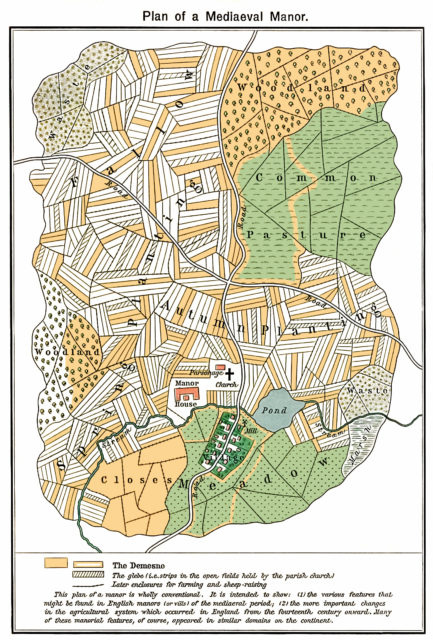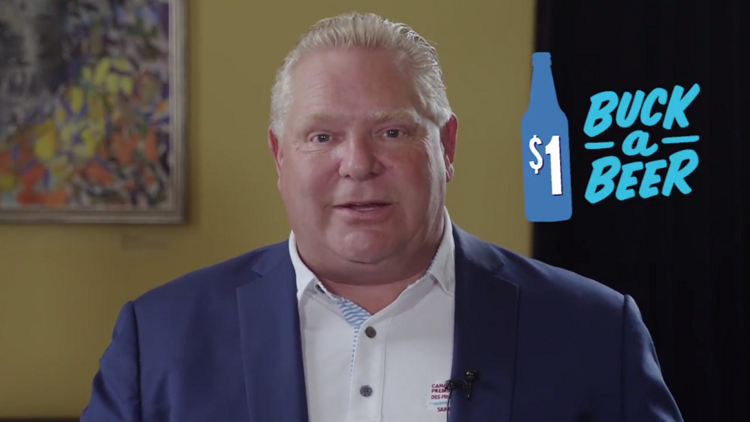TimeGhost History
Published on 31 Aug 2018This is it! The moment we’ve been working up to all year is here – time for Indy and Spartacus to tell what has gone on and what will happen!
Join us on Patreon: https://www.patreon.com/TimeGhostHistory
Executive Producers: Bodo Rittenauer, Astrid Deinhard, Indy Neidell, Spartacus Olsson
A TimeGhost public announcement produced by OnLion Entertainment GmbH
August 31, 2018
World War 2 in Real Time w. Indy Neidell Starts Tomorrow 1 Sep 2018
Experimental strip farm demonstrates why strip farming was eventually abandoned
Tim Worstall uses an article in the Guardian about a National Trust experimental replication of medieval farming patterns to point out exactly why modern farms do not use them:

Plan of a fictional medieval manor. The mustard-coloured areas are part of the demesne (owned by the lord), the hatched areas part of the glebe (reserved to support the parish priest).
Illustration from William R. Shepherd’s Historical Atlas, 1923 via Wikimedia Commons.
The proof of the inefficiency is in the presence of that lots more wildlife. We’re trying to grow food for humans to eat recall. So, more wildlife eating off the same earth is less food for humans. We have more butterflies around? That’s nice, but that does mean more caterpillars munching on those now not for humans crops. Hen harriers? Great, but they’re eating the mice and the voles living off those crops. Land that’s growing wildflowers isn’t growing grain or veggies for us, is it?
Sure, it’s nice to have hen harriers, great to have wildflowers. But their very existence on this land shows that this method of farming is less efficient at doing the job of farming – growing food for us. Which is why we abandoned this method of farming of course. Under the simple and basic pressures of trying to gain more output from our inputs. And yes, land is, obviously enough, an input into farming.
And if we’d like to have flowers and harriers? Then we should be using the most efficient farming methods on those areas we do farm so as to leave more space, more land, for the pretty things we’d also like to have. That is, prairies of glycophosphate drenched wheat for us, the other 30 or 50 or 70% of the land left alone for them. And the more chemicals we use on our bit the smaller that bit devoted to us is going to be.
The very fact that we’ve more wildlife as a result of this inefficient farming method shows us that we must be using the more efficient industrial methods. You know, to save the wildlife?
The American First Army Gears Up – Germany Retreats I THE GREAT WAR – Week 214
The Great War
Published on 30 Aug 2018As the German Army withdraws along the Western Front, the Entente prepares for ever more offensives. This includes the newly founded American First Army which will have the task to attack the Germans in the Meuse-Argonnes area.
Farewell, buck-a-beer publicity stunt, we hardly knew ye
Chris Selley on the all-too-brief publicity stunt of cheaper beer for Ontario:
President’s Choice is ending its buck-a-beer promotion on Sept. 3, just days after it started: We get one week, one long weekend and then out of the pool, party’s over, back to class. PC-branded beer will rocket back up to $1.38 a bottle when you buy 24 at The Beer Store or $1.65 when you buy 12, which highlights just how steep — and presumably unsustainable — the discount really was. We shall see how long the two other participating breweries’ offers last, but they made it quite clear, as did PC, that this was a limited-time offer prompted by Doug Ford’s most shamelessly blunt populist pledge.
My goodness, though, what a commotion it will leave in its wake. Some brewers quite understandably took the opportunity to note the impact of aluminum tariffs on their bottom lines, to complain that Ford’s government was playing favourites by giving away expensive product placement in LCBO stores for $1 beer, and to note the government is actually raising taxes on beer.
Others, however, waxed utterly scandalized. “How about buck a pound of steak? Who would eat that?” asked one Toronto brewer who had perhaps not entirely thought through his rhetorical question. “We haven’t even given two thoughts about this,” Great Lakes Brewery’s communications manager, Troy Burtch, told the Toronto Star. “Why would anyone do this?” Burtch and Great Lakes have signalled their total uninterest by tweeting incessantly about it.
The Canadian Taxpayers’ Federation went after some of the affronted craft brewers for accepting taxpayer subsidies for their higher-end products. People on social media lined up for and against buck-a-beer, vowing to boycott the participants or those complaining about the program.
The whole thing was a dumb Ford Nation stunt, no question. But good grief. You can hardly blame the breweries, either for participating or for not: they were just trying to wring as much publicity as they could from the situation. No one is really any worse off, or at least not much. What we were really seeing among the chattering classes was a rerun-by-proxy of the June 6 election: to drink Ford’s swill was to vote Ford Nation; to boycott it was to stand bravely against their entire agenda.
How did Britain Conquer India? | Animated History
The Armchair Historian
Published on 10 Aug 2018Check out History With Hilbert: https://www.youtube.com/watch?v=Hs1sw…
Our Patreon: https://www.patreon.com/armchairhistory
Our Twitter: https://twitter.com/ArmchairHist
Sources:
https://dailyhistory.org/Why_was_Brit…
1857 Indian War of Independence: 1857 Indian Sepoys’ Mutiny, Shahid Hussain Raja
The East India Company, Brian Gardner
The Corporation that Changed the World: How the East India Company Shaped the Modern Multinational, Nick Robins
A History of India, Peter Robb
QotD: Victim mentality
Does feeling like a victim make one behave more or less selfishly? Imagine that an individual feels wronged by an everyday event: An executive sees a colleague receive a promotion that she feels she deserved instead; an academic finds out that he is once more assigned to a tedious committee, whereas his colleagues seem miraculously spared; an author is about to send off a manuscript when a computer glitch erases weeks’ worth of work, and she is penalized for missing her deadline.
As these individuals contemplate their unfortunate lot, how motivated would they be to help others? One could imagine that individuals who have received the short end of the stick would be especially motivated to help others, to redress other wrongs, or to make themselves feel better with the warm glow that comes from doing good. In this article, we make the opposite prediction: We propose instead that feeling wronged gives people a sense of entitlement to obtain positive outcomes — and to avoid negative ones — that frees them from the usual requirements of social life. Whereas individuals typically contend with a strong norm of benevolence that encourages helping and curbs egoism, we propose that wronged individuals, because of their heightened sense of entitlement, feel relieved from this communal obligation and therefore exhibit more selfish intentions and behavior.
[…]
Our research has shown that people who have just been wronged or reminded of a time when they were wronged feel entitled to positive outcomes, leading them to behave selfishly. They no longer feel obligated to suffer for others and therefore pass up opportunities to be helpful. By contributing to our general understanding of the determinants of selfishness, this research points toward one possible impediment to people’s engagement in charitable behavior. Future research in this vein thus has the potential to identify novel methods to encourage altruism in people who feel wronged, thereby stemming the cycle of suffering-to-selfishness suggested by our research.
Emily M. Zitek, et. al., “Victim Entitlement to Behave Selfishly”, Journal of Personality and Social Psychology, 2010-02.




